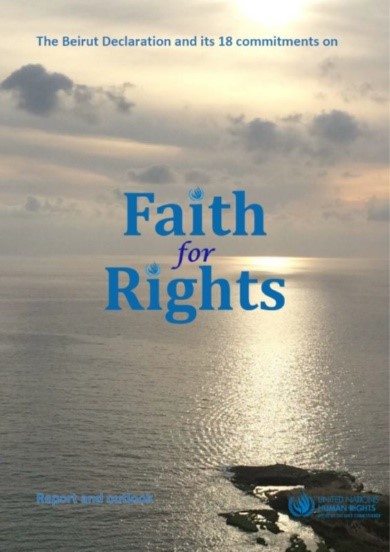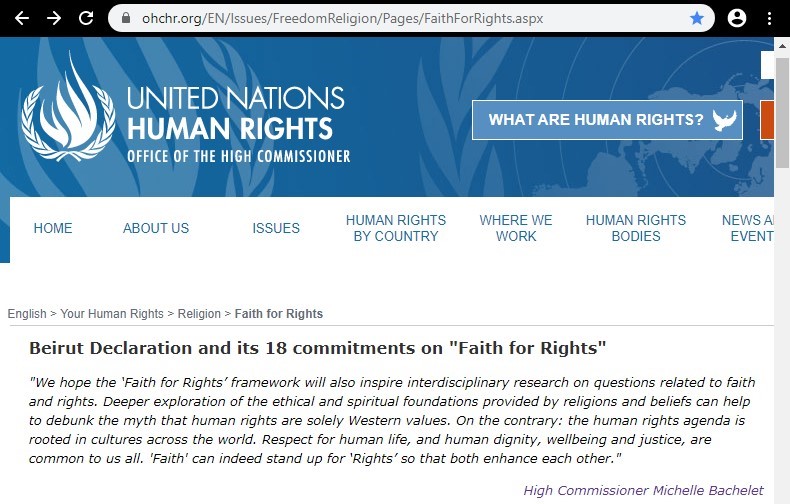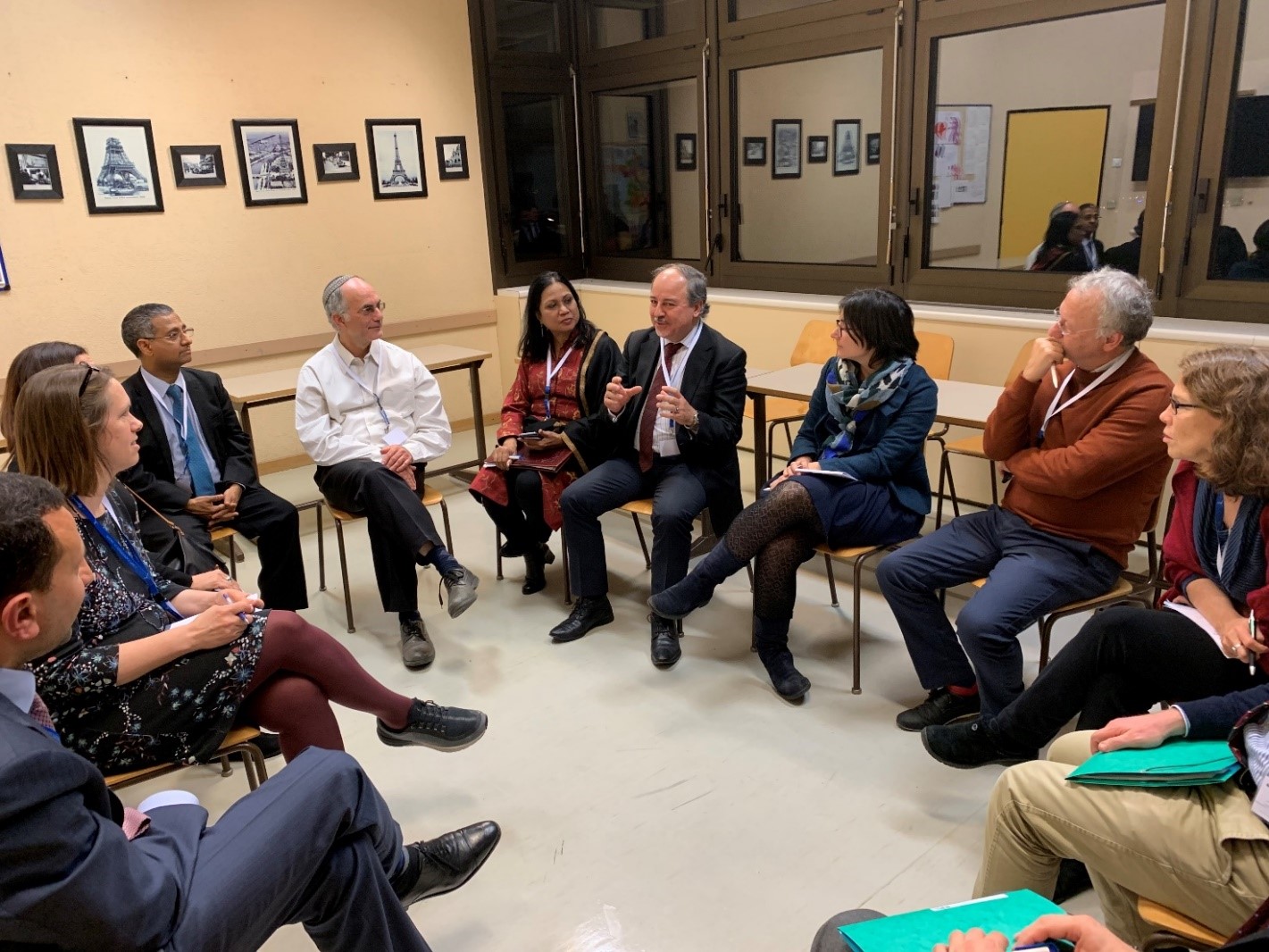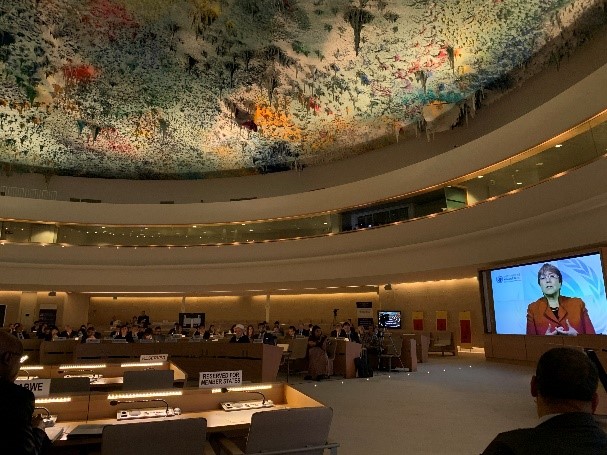#Faith4Rights toolkit
18 peer-to-peer learning modules
Introduction and context
|
"In recent years, my Office has been working with faith-based actors to conceive the 'Faith for Rights' framework. Its 18 commitments reach out to people of different religions and beliefs in all regions of the world, to promote a common, action-oriented platform. The 'Faith for Rights' framework includes a commitment not to tolerate exclusionary interpretations, which instrumentalize religions, beliefs or their followers for electoral purposes or political gains. In this context, it is vital to protect religious minorities, refugees and migrants, particularly where they have been targeted by incitement to hatred and violence. We look forward to seeing the 'Faith for Rights' framework translated into practical outreach tools and capacity-building programmes. […] We hope the 'Faith for Rights' framework will also inspire interdisciplinary research on questions related to faith and rights.Deeper exploration of the ethical and spiritual foundations provided by religions and beliefs can help to debunk the myth that human rights are solely Western values. On the contrary: the human rights agenda is rooted in cultures across the world. Respect for human life, and human dignity, wellbeing and justice, are common to us all. 'Faith' can indeed stand up for 'Rights' so that both enhance each other."
Michelle Bachelet, UN High Commissioner for Human Rights |
This #Faith4Rights toolkit (also available as PDF), as refined by human rights experts and faith actors in Collonges in December 2019, suggests prototypes of peer-to-peer learning modules, exploring the relationship between religions, beliefs and human rights. It provides approaches that are adapted to faith actors, civil society representatives and educational institutions. It stimulates an interdisciplinary discussion on “faith” and “rights”, in relation to 18 key topics that serves a triple purpose: (1) engaging to ensure ownership, (2) thinking critically to face challenges, and (3) reinforcing the mutual enhancement between faith and rights.
Implementing the #Faith4Rights toolkit relies on facilitators who prepare the peer-to-peer learning sessions. The use of this toolkit requires facilitators to familiarize themselves with existing human rights education methodologies prepared by OHCHR and other stakeholders. Facilitators of the #Faith4Rights toolkit should be knowledgeable in both disciplines of faith and rights and have coaching experience. Otherwise, a team of two or more facilitators whose competences complement each other should co-moderate the peer-to-peer learning exercise.
For each of the 18 learning modules, facilitators need to prepare and choose the most relevant learning material among the wide range of resources offered in this toolkit. Even if they take existing material as it stands, facilitators still need to relate it to their respective environments and learning objectives. In addition, facilitators would continue to think through the sessions, taking into account any feedback from participants so as to adapt to the needs of the audience. This would also inspire enhancement of the modules for the benefit of future collective learning exercises.
 Beyond learning and training purposes, this #Faith4Rights toolkit could be seen as a facilitator's guide for implementing interfaith collaboration projects and enriching the report and outlook on "Faith for Rights". The Beirut Declaration on "Faith for Rights" contains five fundamental principles to guide its implementation: transcending dialogue to action; avoiding theological divides; being introspective; speaking in one voice; and acting in an independent manner. These are cornerstones of the "Faith for Rights" vision and its implementation tool, the #Faith4Rights toolkit.
Beyond learning and training purposes, this #Faith4Rights toolkit could be seen as a facilitator's guide for implementing interfaith collaboration projects and enriching the report and outlook on "Faith for Rights". The Beirut Declaration on "Faith for Rights" contains five fundamental principles to guide its implementation: transcending dialogue to action; avoiding theological divides; being introspective; speaking in one voice; and acting in an independent manner. These are cornerstones of the "Faith for Rights" vision and its implementation tool, the #Faith4Rights toolkit.
Facilitators should observe these five principles while using this toolkit:
"[…] we pledge as believers (whether theistic, non-theistic, atheistic or other) to fully adhere to five fundamental principles:
(a) Transcending traditional inter-faith dialogues into concrete action-oriented Faith for Rights (F4R) projects at the local level. While dialogue is important, it is not an end in itself. Good intentions are of limited value without corresponding action. Change on the ground is the goal and concerted action is its logical means.
- "Faith is grounded in the heart when it is demonstrated by deeds." (Hadith)
(b) Avoiding theological and doctrinal divides in order to act on areas of shared inter-faith and intra-faith vision as defined in the present F4R declaration. This declaration is not conceived to be a tool for dialogue among religions but rather a joint platform for common action in defence of human dignity for all. While we respect freedom of expression and entertain no illusion as to the continuation of a level of controversy at different levels of religious discourse, we are resolved to challenge the manipulation of religions in both politics and conflicts. We intend to be a balancing united voice of solidarity, reason, compassion, moderation, enlightenment and corresponding collective action at the grassroots level.
(c) Introspectiveness is a virtue we cherish. We will all speak up and act first and foremost on our own weaknesses and challenges within our respective communities. We will address more global issues collectively and consistently, after internal and inclusive deliberation that preserves our most precious strength, i.e. integrity.
(d) Speaking with one voice, particularly against any advocacy of hatred that amounts to inciting violence, discrimination or any other violation of the equal dignity that all human beings enjoy regardless of their religion, belief, gender, political or other opinion, national or social origin, or any other status. Denouncing incitement to hatred, injustices, discrimination on religious grounds or any form of religious intolerance is not enough. We have a duty to redress hate speech by remedial compassion and solidarity that heals hearts and societies alike. Our words of redress should transcend religious or belief boundaries. Such boundaries should thus no longer remain a free land for manipulators, xenophobes, populists and violent extremists.
(e) We are resolved to act in a fully independent manner, abiding only by our conscience, while seeking partnerships with religious and secular authorities, relevant governmental bodies and non-State actors wherever Faith for Rights coalitions are freely established in conformity with the present declaration."
In this vein, the 2021 Forum on Minority Issues encouraged States, the United Nations, international and regional organizations and civil society to work closely in supporting the positive contributions of faith- based actors, including through the promotion of the Beirut Declaration and the #Faith4Rights toolkit. In 2022, the Council of Europe’s Committee of Ministers recommended to ensure that human rights education, education for democratic citizenship and media and information literacy are part of the general education curriculum, and in this regard the Council of Europe’s explanatory memorandum commented that the UN Faith for Rights Framework and Toolkit is a useful tool with its peer-to-peer learning methodology.
The overall goal of this #Faith4Rights toolkit, through a human rights-based approach, is to shift from abstract inter-religious dialogues, with little concrete outcomes, into individual and joint positive actions by faith actors in defence of human dignity for all. This peer-to-peer learning methodology focuses on concrete case studies and real-life experiences as witnessed – and often shared – by the participants themselves.
This #Faith4Rights toolkit is not and will never be a final piece of work. It is meant to remain a permanent work in progress through refinement based on cumulative practice and relevant developments. The reason lies at the heart of the “Faith for Rights” framework: challenges to both “faith” and “rights” are moving targets of constantly changing dynamics. Responses thereto should follow the same path. Collective learning from each other’s experiences optimises chances of faster and safer progress towards the goals of the “Faith for Rights” framework. It is also worth noting that most of the case studies in this toolkit emanate from the outcomes of international human rights mechanisms, which also requires regular updating.
 The "Faith for Rights" website will serve as the virtual hub that provides faith actors with these outcomes and other regular updates related to the topics they have been trained on using the #Faith4Rights toolkit. This knowledge management tool will be an open space for free capacity-development opportunities. This would also facilitate interaction within communities of practice to perpetuate the benefits of exchanges among faith actors on related research, standards, initiatives and human rights developments. This collaborative space of continued peer-to-peer learning will also link to OHCHR resources that are useful for faith actors in their endeavour for human dignity, including selected updates on the outcomes of international human rights mechanisms that are of particular relevance to faith actors. Facilitators of "Faith for Rights" peer-to-peer learning are kindly requested to share any feedback, experiences from local training sessions and additional materials they may suggest to enrich the #Faith4Rights toolkit and "social-mediatize" its follow-up activities, by sending an email to: OHCHR-faith4rights@un.org
The "Faith for Rights" website will serve as the virtual hub that provides faith actors with these outcomes and other regular updates related to the topics they have been trained on using the #Faith4Rights toolkit. This knowledge management tool will be an open space for free capacity-development opportunities. This would also facilitate interaction within communities of practice to perpetuate the benefits of exchanges among faith actors on related research, standards, initiatives and human rights developments. This collaborative space of continued peer-to-peer learning will also link to OHCHR resources that are useful for faith actors in their endeavour for human dignity, including selected updates on the outcomes of international human rights mechanisms that are of particular relevance to faith actors. Facilitators of "Faith for Rights" peer-to-peer learning are kindly requested to share any feedback, experiences from local training sessions and additional materials they may suggest to enrich the #Faith4Rights toolkit and "social-mediatize" its follow-up activities, by sending an email to: OHCHR-faith4rights@un.org
Contextual tips for facilitators
It is important at the outset to draw the attention of facilitators of “Faith for Rights” learning sessions to a number of tips. They are meant to assist both the preparation by facilitators of their peer-to-peer learning sessions as well as for conducting them successfully:
- The #Faith4Rights modules are flexible and require adaptation by the facilitators before their use. Case studies related to peer-to-peer exercises in the 18 modules need to be selected by the facilitators from within the environment where the learning takes place. The #Faith4Rights toolkit is a prototype methodology that requires contextualization, based on the text of the 18 commitments, context and additional supporting documents.
- Not all issues raised need to be resolved. This would be an impossible and even a counterproductive target. The aim is rather to enhance critical thinking and communication skills, admitting that some questions could receive many answers, depending on numerous factors.
- Tensions may occur during discussions related to “faith” and “rights”. Most of these tensions are due to human interpretations. Learning sessions are spaces for constructive dialogue in a dynamic process where tensions can be reduced with the help of clear methodologies, including pre-emptive situation analysis and evidence of positive results in areas of intersectionality between faith and rights.
- When preparing the sessions, facilitators need to factor in the profile, age and backgrounds of participants (see the article on Bridging the divides through “Faith for Rights”). Focused attention on the learning objectives can transform tensions into constructive exploration of new ideas.
- Meaningful engagement requires democratically pre-established rules. Facilitators should dedicate time with participants to elaborate these rules together at the outset (see below module 0) and acting all along the training as their custodians.
- The time frames suggested in this #Faith4Rights toolkit are merely indicative. Facilitators may adapt them freely to suit the needs of their group of participants. The key balance is between respecting the overall timeframe while not cutting short a positive exchange momentum.
- To ensure optimal and sustainable benefit, facilitators may create a “training notebook” for participants during their peer-to-peer learning sessions. It would contain a compilation of templates to help participants keep track of what they have learned throughout the programme and eventually use this notebook as their personalised follow-up tool.
- When technically feasible, facilitators are also advised to project the module under discussion on screen in order to alternate between discussions thereon and showing the audio-visual materials listed in each module or any other items selected by the facilitator themselves. As a teaser, the facilitator could show the short video of an audio-visual journey through the 18 commitments on “Faith for Rights” which includes religious quotes in Arabic, English, French, Hebrew and Punjabi as well as a pertinent excerpt of human rights treaty bodies’ general comment on harmful practices.
- The COVID-19 pandemic triggers various human rights challenges (see below modules 5, 6, 16 and 17) and consequently peer-to-peer learning events have increasingly moved online (see the webinar and article on responding to pandemics).
- In December 2022, the Gandhi-King Global Academy launched the online course (free registration) on Religions, Beliefs, and Human Rights: A “Faith for Rights” Approach.
- Please also check the Facilitator Guide hosted by the International Center for Law and Religion Studies.
- Human rights are not only about law – artistic expressions carry them, too. Facilitators are encouraged to use non-traditional support material for their discussions. Each of the modules of the #Faith4Rights toolkit “features inspiring examples of artistic expressions, including through photos, videos, music, improvisation, dance, street art, social media, cartoons and calligraphies.”

overview ¦ Module 0 >
